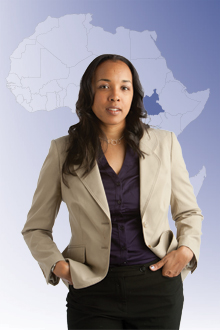For the Good of South Sudan
By Lori Atherton

Shortly after South Sudan—the United Nations' 193rd member state—gained its independence on July 9, Professor Laura Beny penned a Newsweek piece in which she expressed cautious optimism for the leadership of President Salva Kiir Mayardit.
"One of the best gifts the world can give to the new nation," she wrote, "is unwavering support of President Kiir's cabinet's efforts to forge a successful nation-state under what at times will seem like impossible circumstances."
Beny is all too aware of the impossible situations South Sudan has endured for decades, from civil wars and genocide to the lack of infrastructure, jobs, and clean drinking water. Born in Khartoum, Sudan, to a Southern Sudanese father and an American mother, Beny moved to the United States when she was 10 years old. Growing up, she was kept informed of the news within her home country and, as a result, sought to use her training as an economist and lawyer for the betterment of Sudan.
Since 2006, she has made yearly trips to Sudan to visit relatives, conduct research, and work on projects related to rule of law, corporate law, and law and development, including advising the government of South Sudan on corporate governance and transparency in South Sudan's nascent private sector.
In 2009, Beny and economist Melody Atil co-founded Peace Dividend, an online platform that provides financing to South Sudanese entrepreneurs lacking access to traditional lending sources. Peace Dividend, a client of Michigan Law's International Transactions Clinic, has been trying to raise funds, for example, to support the work of a former tailor who is developing a means of delivering cassava from rural areas to urban markets.
"South Sudan is one of the most agriculturally rich countries in the world," Beny noted, "but it imports most of its produce. Because of the lack of infrastructure, because of 22 years of war, they don't have the roads to get products to market, and they don't have the knowledge of marketing and distribution. It creates a situation where there are not enough jobs, because everything comes from neighboring countries. We [Peace Dividend] like to target enterprises that create opportunities for jobs."
Also on Beny's plate is her forthcoming book (scheduled for release in 2011 or 2012), Sudan's Killing Fields: Perspectives on Genocide, of which she is a co-editor. The book is a collection of essays that shed light on the human rights abuses perpetrated by the government against indigenous peoples across all marginalized areas of Sudan, not just against those in the western Sudanese area of Darfur. It also sheds light on the historical and contemporary causes of the secession of South Sudan in 2011 from the larger Sudan, creating the world's 193rd country earlier this year.
"Even though the south has separated and the war between the north and south has officially ended, there is still a high genocide risk in the remaining parts of northern Sudan, in the peripheral areas," Beny said. "A review of those atrocities would go a long way in explaining to an American audience why Sudan has been partitioned into two countries."